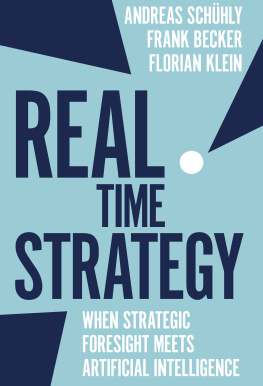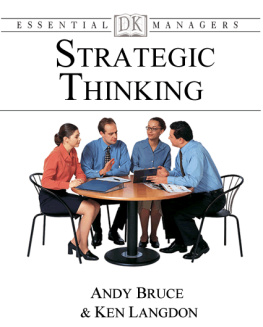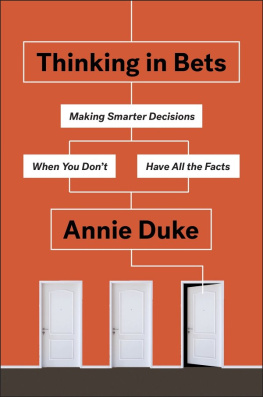REAL TIME STRATEGY
When Strategic Foresight Meets
Artificial Intelligence
By
Andreas Schhly
Frank Becker
Florian Klein

United Kingdom North America Japan
India Malaysia China
Emerald Publishing Limited
Howard House, Wagon Lane, Bingley BD16 1WA, UK
First edition 2020
Copyright 2020 by Emerald Publishing Limited
Reprints and permissions service
Contact:
No part of this book may be reproduced, stored in a retrieval system, transmitted in any form or by any means electronic, mechanical, photocopying, recording or otherwise without either the prior written permission of the publisher or a licence permitting restricted copying issued in the UK by The Copyright Licensing Agency and in the USA by The Copyright Clearance Center. Any opinions expressed in the chapters are those of the authors. Whilst Emerald makes every effort to ensure the quality and accuracy of its content, Emerald makes no representation implied or otherwise, as to the chapters suitability and application and disclaims any warranties, express or implied, to their use.
British Library Cataloguing in Publication Data
A catalogue record for this book is available from the British Library
ISBN: 978-1-78756-812-9 (Print)
ISBN: 978-1-78756-811-2 (Online)
ISBN: 978-1-78756-813-6 (Epub)

To all our colleagues who contributed to this book. You give us the means to take the long view.
Kudos to Maximiliane Brecht, Nadine Manger, and Niclas Vieten for their critical reviews and input along our journey.
And to our family and friends. You give us the reasons to take the long view.
Special thanks to Alina, Christine, and Paloma for their continuous support and patience.
Andreas, Frank, and Florian
CONTENTS
LIST OF TABLES AND FIGURES
AN INITIAL REFLECTION
This is an unorthodox book in a singular moment in history. Over the following pages, we will paint the picture of how strategic thinking and decision making is being disrupted before our very eyes.
For the record, let us be clear from the outset that the old world of strategic planning is neither dead nor dying. The established rules of the game still stand. The literature around the mechanics of competition and the sources of sustainable competitive advantages remains as valid as it has been for decades. What has changed is the world around us. Globalisation and the hyper-connectivity of people and markets have dramatically increased the volatility of our societies and economies. Among the victims of those developments are the validity and the lifespan of conventional strategic planning. What is the point of the most sophisticated 5- or 10-year strategic plans if they fail to take into account the next wave of populist policies, the next game-changing technology, or surprising changes in the consumer preferences of digital natives? This book is an attempt to establish the need for dynamic strategic management that is capable of reacting to sudden, unexpected moves in the context of our activities, yet still including the long-term focus of strategy.
However, there is an even more profound tectonic shift building up at this moment, and it concerns how people and in particular big, complex organisations, take strategically important decisions. Since humankind has evolved into societies and organisations, the really important and tricky decisions were taken by individuals such as kings, presidents or CEOs, or relatively reduced groups such as parliaments or executive committees. Decision makers base their choices on their own experience and on the advice of their inner circle. The advisors, in turn, draw their wisdom from their experience and from established facts such as statistical offices or the state of academic literature.
By and large, that approach appears to have served us well for ages. However, there are several reasons why conventional decision making might not function as neatly in the future. Globalisation and hyper-connectivity are some of them. As the complexity of the decisions increases, decision makers hit the limit of what they are capable of factoring in. Given the multitude of issues and the limited attention span of high-ranking decision makers, there is a limit to how much decision makers can reasonably study, absorb, and reflect. Yet, this is not just an issue of the corporate world but also of our entire society. Humankind is failing to address many problems appropriately due to the sheer complexity of issues like climate change. There are just too many factors and viewpoints to take into account, and this leads to the second reason why conventional decision making is in crisis.
The basis for our decision making, the body of established facts, opinions, and ideas has grown beyond what decision makers and their advisors are capable of grasping. In our hyper-connected world, the speed of the discussions has accelerated in popular fora such as social media, and in professional arenas such as academia. Today, we are drowning in a tsunami of facts, figures, fake news, and individual opinions. Therefore, how could one expect professional decision makers to stay on top of this?
We propose a technology-based answer to this technology-induced problem. This book will speak about how we can improve the way we perceive what is going on around (through better, real-time sensing), and how we can enhance the way we process, interpret, and reflect on what we see (through broader, more holistic sense making). Using both levers, decision makers should be able to upgrade their capacity to perceive and understand complex problems and enhance their capability to act on them.
This constellation, the need to combine established strategic thinking with the brave new digital world of Big Data and Artificial Intelligence (AI), has brought the three authors together. Andreas Schhly is a digital native, scenario practitioner and scholar of the cultural aspects of scenario planning. Frank Becker is a complexity scientist and brings in technological expertise. Florian Klein is an expert strategist and scenario planner, and an observer of its evolution. Combining our perspectives, we would like to show you how the frontier between human-based strategic thinking and AI-based sensing has faded, and how decision makers and their advisors might use AI in the future to boost their capacity to take forward-looking decisions.
1
THREE CHEERS TO UNCERTAINTY
Uncertainty is a fact of life. It surrounds us, forcing us to make difficult decisions. It is also the reason for evolution, as the survival of the fittest implies a capability to understand the rules of the game, anticipate future developments, and execute forward-looking strategies. It may be a nuisance, but it is also the only chance for the smart to prevail in competition.
Throughout history, humanity has always faced uncertainty, but at different levels and in the form of distinct issues. Early humans faced elementary uncertainty, typically related to basic needs such as security, food, or shelter. In our developed world with complex societies and intertwined economies, critical uncertainties have shifted. Decision makers today are typically interested in rather abstract issues like future technology ecosystems, global trade regimes, or changing customer needs. As distinct as these problems may seem, they have one element in common: they reflect uncertainty from our particular perspective. When we seek to ensure survival for ourselves or our clan, or when we assess the potential for market growth for our company, we try to anticipate and solve a specific, defined problem for a particular stakeholder group. They are the type of problems that capable leaders with competent advisors should be able to figure out.








